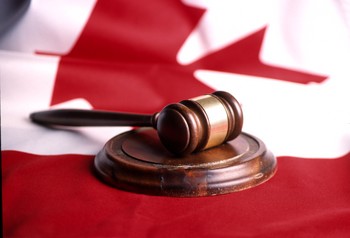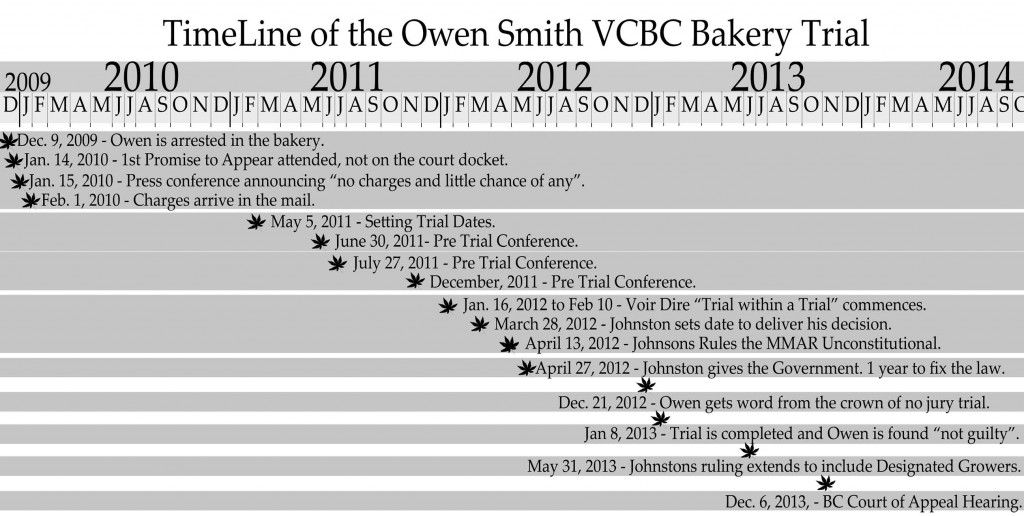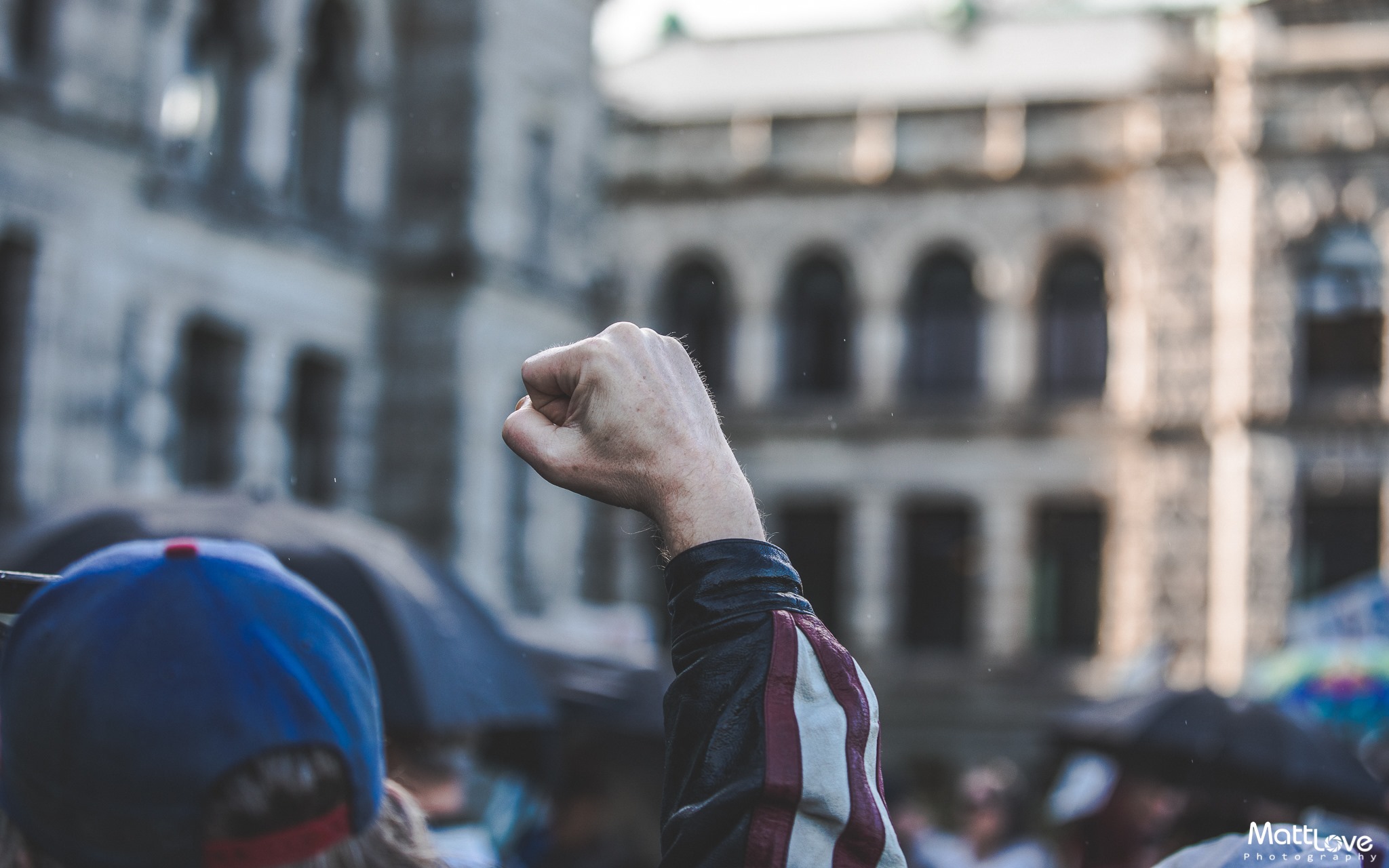Kirk Tousaw Brilliantly Attacks MMAR
By Owen Smith
But I thought we already won?
In my last article, I tracked the arrival and spread of medicinal cannabis culture in the modern world, spotlighting the development of extract products made to help the general population as well as specific cases, such as children with seizures. In this article I will return to the constitutional challenge for medicinal cannabis extracts that I launched with the Victoria Cannabis Buyers Club four years ago. We recently visited the BC Court of Appeal to restate our argument and defend our lower court victory.
The appeal was filed after my short trial and acquittal in Jan. 2013. Nine months earlier, our argument for extracts had been successful in the BC Supreme Court, effectively legalizing medicinal cannabis extracts for federally licensed patients, and eventually their caregivers, in our province. The judge ruled that my trial should proceed regardless of the constitutional victory because “society’s interests in having the charges against Mr. Smith tried on their merits outweigh the violation of Mr. Smith’s liberty right, at least sufficiently to deny him the judicial stay he seeks.”
We assumed that this was because making edible products for a dispensary is still illegal. Because only about 10 percent of the members of the VCBC have federal licenses, we would have some explaining to do. We’re vigilant, knowing a large community of lovely people who have been diagnosed with permanent physical diseases or disabilities stand behind us, each awaiting a chance to explain how at the end of long painful paths they’ve persevered to find that cannabis works for them. We prepared to appear at trial nine months later.
At the trial in Jan. 2013, I was found not guilty after the Crown chose to present no evidence. The Crown explained that because the judge had ruled the law unconstitutional, their case was “significantly impacted” and by using the common law defense of necessity, I would only win. The judge didn’t look impressed.
Launching the Appeal
The Crown then entered their appeal and prepared to ask the higher court to overturn Judge Johnston’s decision and order a new jury trial, one where Johnston’s decision would no longer exist. They did not appeal the solid scientific facts of the case. The Crown appealed on the basis that the law had been misinterpreted in a number of ways by the BC Supreme Court Judge.
The legal equation is made in two stages: Judge Johnston not only had to determine that the law restricting individuals to dried marihuana was in violation of individuals’ Section 7 charter “freedom to make fundamental choices regarding one’s personal health and safety”; but also that this deprivation of life, liberty, or security of the person does not accord with the principles of fundamental justice, the government’s Section 1 charter right. In other words, you can be deprived of your rights if it is for your own good.
Johnston ruled that the distinction in the law that restricts patients to dried marihuana “unnecesarily impairs the security right to choose how to ingest the medicinal ingredients in the safest and most effective manner”. He concurrently ruled that restriction is arbitrary as it does little or nothing to enhance the state’s interests.
While his order legalized these products for people B.C., this appeal is the only response from the federal government regarding the Judge’s ruling, and Health Canada have now introduced a new system that also restricts patients to dried cannabis. Our lawyer Kirk Tousaw prepared a thorough and detailed response to the government’s appeal. Both factums and the appeal can be found on the Cannabis Digest Forums.
I have created this interactive online timeline to help people to understand the trial as it has unfolded. It is a chronological record of all of the articles and videos from the mainstream and private media sources I could find alongside all of the related events. Here is a simplified version.
A Mysterious Memorandum
Just two days before we were due to travel to Vancouver’s Court of Appeal, we received a Memorandum from the Appeal Court Judges. Surprisingly, the Memorandum requested that we discuss “Standing”: that is, whether or not I have the right to raise the constitutional argument at all. It said:
“Specifically, the division wishes counsel to address the question of how Mr. Smith’s admitted trafficking in marihuana, when he has no authorization to do so in any form under the Marihuana Medical Access Regulations, raises any question of the constitutionality of the restriction in those regulations on the form of marihuana distributed.”
As I am not seriously ill, I do not have a license to possess; as I am not a cannabis grower, I do not have a license to grow for somebody. Under the federal regulations there is no license to make cannabis infused vegetable oils to bake cookies, make lozenges, or fill gel capsules. I considered it my duty to help fill this void by providing edible products to people in bona fide medical need. Besides clubs like the Victoria Cannabis Buyers Club, there still is no secure way for critically ill people to obtain edible cannabis products that have been refined for quality control.
It came as a surprise that after four years of appearances and conferences, and two trials, now we were being told that perhaps we couldn’t have made the challenge at all. My once formidable timeline suddenly seemed quite fragile.
I was assured that there are well-established higher court rulings regarding my right to make the constitutional challenge and that the court of Appeal would need to see these revisited by the Supreme Court before becoming applicable in my case. However, the possibility of years of delay is still unsettling for many who cannot afford to compound their serious conditions with the anxiety and plausible realities of being arrested.
The Appeal
On a cold wintry December morning in Vancouver, I attended the BC Court of Appeal to witness the oral arguments of the two Crown prosecutors and my lawyer, Kirk Tousaw, in front of three Judges. I had spent the evening before at the BC Marijuana Party HQ, between the Vapor Lounge and the Herb Museum in the heart of Vansterdam.
My partner Coco and I had breakfast with Kirk and Ian Mulgrew, veteran columnist for the Vancouver Sun, in the court restaurant. Ian warned us during breakfast that this experience would be excruciatingly boring and that the court of appeal likes to Punt, avoiding any opportunity to make a decision if possible. The single row of seats at the back of courtroom was full. The three judges entered together, casting stern straight looks at the audience.
They began the day by addressing the “Standing” issue raised in their memorandum. They asked the Crown if I had the right to make the challenge, to which the Crown responded that there was a lot of precedent established that I could. Kirk agreed that the Supreme Court of Canada ruled in 1988 that no one can be convicted under a law that is unconstitutional even if their rights are not infringed.
When asked why I had not been been prosecuted like any other drug trafficker, they stated the position that “after studying the reasons and assessing its case, the Crown concluded that the constitutional ruling significantly impacted on the Crown’s ability to present its case to the jury”. The Crown repeated this point a number of times, even paraphrasing what I would have said on the stand in the jury trial.
They were sure that the jury would be made aware of the Judges’ constitutional ruling from the Voir Dire and would be obliged to decide in accordance with it. This argument raised the question of how much impact the decision in the “Voir Dire” actually has on unlicensed extract producers, who clandestinely operate compassionate kitchens for sick people across the country.
Ian Mulgrew gave his straight impression at the first break. “You’re busted” he said to Punt, seeing the Judges’ focus on the issue of Standing to be an avenue the court may seek to use to dismiss the case altogether.
Although most of the morning felt like I was watching Boba Fett brood over the chance to offer another carbonite statue to Jabba the Hut, Kirk Tousaw offered brief but decisive flashes of positive energy.
The Crown’s Arguments
The Crown had hired two new lawyers—Mr. Leong and Paul Riley. Leong was friendly, soft spoken and respectful, and we chatted at the break and he told me he considered me an “interested spectator.” At a previous court appearance in Victoria, Mr. Leong had told me he wanted me to know that I was no longer being charged and it was a remarkable act to overturn the will of Parliament. During the Appeal, Mr. Leong remained seated, only occasionally turning to survey the room, sometimes with a smile that seemed on the edge of laughter. Paul Riley did all the talking.
They claimed that having edible cannabis products is an unqualified choice of patients, which creates risks because it is an untested and illegal controlled substance. They posited that the trial judge had underestimated the critical abilities that policies attain when working together in a synthesis of catalytic interdependence, namely the triple force of the Food and Drug Act, the Controlled Drugs & Substances Act, and the Medical Marihuana Access Regulations.
They asserted that conventional cannabis-based products that have undergone regulatory approval—such as Sativex and Marinol—are available through prescription from a doctor, making homemade cannabis products unnecessary. Kirk later responded that the MMAR forms make it clear that before you receive a federal licence to receive medical cannabis, “conventional treatments […] have been tried or considered, and have been found to be ineffective or medically inappropriate for the treatment of the applicant.”
They read from the decision in R.v.Mernagh, where the Ontario Appeal Court judges state “there is no right to prefer an illegal treatment over a legal one.” Matt Mernagh had attempted to show that the MMAR program was an illusion because nobody could access it; we are attempting to show that the definition of dried marihuana that is provided to the program participants is essentially an illusion. Although a doctor must prescribe it, patients can choose to have their medicine refined from its inert plant bulk in order to ingest the medicinal ingredients in the safest and most effective manner.
The Crown argued that the Supreme Court had already ruled in R.v.Malmo-Levine that the prohibition against recreational cannabis use is justified out of a preponderance to protect vulnerable groups. They reiterated that it was an unqualified preference of patients that was unsafe.
They read parts of the VCBC Recipe Book and Product Guide and claimed that mild conditions that were listed, like itching, represented our criteria for membership and that this showed that club members weren’t very sick. They asserted that our patient witnesses hadn’t met the standard for life-threatening illness presented in previous constitutional challenges.
Kirk responded that the Crown was limiting the scope of the case to the VCBC, but the club is not the focus of this case. He said that government has elected to keep marihuana beyond the reach of its various agencies set up to protect the public from false or overblown claims, such as through the Natural Health Products Regulation, that deals with these matters in ways other than “unnecessary criminalization.”
They argued that the judge overstated the limitation to mean patients were forced to smoke, asserting that vaporization was a legitimate and safe alternative. Kirk later used the example of the Volcano vaporizer to explain how even a bag of vapor, separated from the plant bulk, could be in violation of the restriction to possessing dried marihuana.
For half an hour after lunch, Riley restated his argument to the Appeal court Judges. The energy of the room began to sink; the wall on the far side of the room was a putrid green with random blueish brown splatters like something borrowed from a dingy subway bathroom. With just over an hour to present our arguments, the Judges informed Kirk that they would be ending early because of ceremony for a new appeal court Judge. Kirk responded that he would happily wrap up early in order to make the ferry back to Vancouver Island to get home in time for his wife to go out, and the whole room laughed.
The Defence’s Argument
Kirk began by showing the Judges three high-resolution colour photographs of the cannabis plant and the resin it produces. The first photograph, taken at a distance, showed a female cannabis flower covered in a short layer of orange-white fuzz; the second was a close-up of a half-dozen trichomes protruding from the surface of the cannabis flower, that make up its fuzzy appearance; the third photograph was of a pile of separated trichome heads.
The photographs had come courtesy of Bubbleman, who along with a few others from Vancouver’s cannabis community, helped to fill the courtroom. Bubbleman is known as the World-Class Hash Master, and is host of Bubbleman’s World on Pot TV. Bubbleman’s photographs illustrated the “golf ball on a tee” structure of the trichome, allowing us to extend the discussion to its scientific base. I have detailed this important aspect of our argument in previous articles (see <cannabisdigest.ca/criminal-trials-or-clinical-trials>)
To highlight this aspect of the argument, Bubbleman uses the pizza box analogy: When you order a pizza, you don’t eat the box. The new program will have more cannabis being delivered to patients than pizzas, but unlike Domino’s, Health Canada wants them to eat the pizza and the box. To the Appeal Court, Kirk eloquently described the plant as the messenger, and the medicinal compounds held in the resin glands as the message.
The evidence from Dr. Pate in our trial was that separating the active compounds in the resin glands from the fibrous bulk of the plant reduces the ingestion of unwanted toxic residue held within the plant. Dr. Pate illustrated with the “golf ball on a tee” analogy how the resin glands are prepared structurally to separate with the faintest of agitation. This botanical fact is not recognized by the law, making the distinction between “legal” and “illegal” precarious. Given that licensed patients risk everything by breaking the law—their license, their medicine, maybe their home and even their life—this reality deserves better definition.
The Patient Witnesses
Kirk had some time to read from the testimony of Gina Herman, who had bravely told her story to the Judge. Like many members of the VCBC, she has dramatically restored her quality of life with medicinal cannabis while reducing her dependence on prescription drugs and eliminating their harmful side effects.
Gina’s prescribed dose of oxycontin rose over time from 40 to 240 milligrams to treat her chronic pain. The psychoactive effects were so severe that her husband and sons would quite frequently report her erratic behavior: “I would just be sitting there by myself and one of the boys would come in from school and I would have been talking to nobody but carrying on a conversation, by myself I guess.” Each member testified that medical cannabis does not make them feel high, but returns them to a pain-free state.
The addictive potential of cannabis is less than that of alcohol or tobacco: The relative potential for dependence on cannabis, expressed as the risk of developing dependence among those who have ever used the substance, is about nine percent – lower than that of alcohol (15 percent), cocaine (17 percent), heroin (23 percent) or tobacco (32 percent).
The ability of the human body to build a tolerance to opioids makes them even more dangerous. There are ten times more cannabinoid receptors in the human body than opioid receptors. There are no cannabinoid receptors in the areas of the brain that control breathing; opioids in these areas are responsible for overdose death by stopping people from breathing.
Our expert witness at trial made this vital difference in safety between cannabinoid and opioid receptors clear: “[Y]ou can easily die from morphine overdose, because first you go to sleep, and if the dose is high enough, you stop breathing, and that’s because the opioid receptors responsible for signalling breathing regulation in the brain […] are overwhelmed by the amount of morphine involved. But there’s no breathing receptor regulatory mechanisms involving cannabinoids receptors, for example, so they don’t have that jeopardy.”
Gina had described how eating cannabis helped her withdraw from her former medications. “Shaking, sick to my stomach, headaches, feeling like there was bugs crawling in my skin. I called it the heebie-jeebies. However, once I got into the VCBC of Canada and started eating the cookies … I seemed to be able to handle it as long as I had the cookie in me.”
She described how the cannabis products from the VCBC helped restore her quality of life and rebuild her relationship with her family. “I am able to get out now. I’m able to see my granddaughter. I am rebuilding my relationship with my youngest son as he was the hardest affected when all this started building up… I can now talk to my six-year-old granddaughter in London, Ontario because I’m not starting a sentence and ending out way in left field where I didn’t even know what I was talking about.”
What Happens Next?
The day was over and I left the same way I entered, resolute and happy that the decision was currently helping thousands of people in B.C., regardless of the persistent opposition of Parliament. The appeal court may take many months to review and reveal their decision. If the Court of Appeal is unanimous, then the losing side can (and likely will) appeal to the Supreme Court of Canada to see the case. If the judges are split 2-1 either way, the case will automatically be sent to the Supreme Court of Canada for review. In the meantime, the clock is ticking on the MMAR, as the new MMPR is cued for center stage on Apr. 1 2014.
Jason and Anne from <MMARcoalitionagainstrepeal.com> were in attendance. They are helping spearhead a class-action lawsuit with lawyer John Conroy to prevent all or some of the new regulations (MMPR) from coming into force. They have aligned with Kirk Tousaw to include our arguments on the issue of extraction for this group of federally licensed Canadian medical marijuana users before the Supreme Court of Canada.
This affair has become far larger and more complex than I had ever imagined. Starting from a humble desire to help people who are less fortunate than myself, I have recently become co-host of the P.A.C.E. (People Advocating Cannabis Education) Radio Show on <www.time4hemp.com> I will be interviewing cannabis advocates from the West Coast every second Wednesday evening at 6 p.m. PST. Thank you for following this epic case, and please leave a comment on the Cannabis Digest Forums.





